Blog
What Can Cause a Plantar Fibroma?
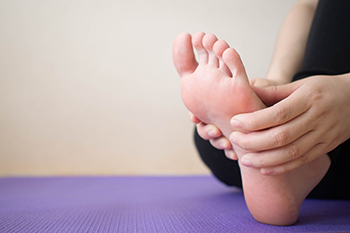
A plantar fibroma is an area of tissue that develops in the arch of the foot that can be painful, despite being benign. Several fibromas on the foot are referred to as plantar fibromatosis. The noticeable symptom of a plantar fibroma is an uncomfortable lump that slowly grows in the arch of the foot. The pain may worsen when the lump is touched or when standing for long periods. There is no known cause for why a plantar fibroma develops, however, enduring repetitive foot injuries may lead to tearing the plantar fascia which may promote the growth of a plantar fibroma. Patients have found mild relief when custom-made orthotics are worn and when specific stretches are performed. If you have a lump on the bottom of your foot, it is suggested that you visit a podiatrist who can properly diagnose and treat a plantar fibroma.
A plantar fibroma may disrupt your daily activities. If you have any concerns, contact Dr. Tupper of Coshocton Foot Health Center. Our doctor can provide the care you need to keep you pain-free and on your feet.
Plantar Fibroma
A plantar fibroma is a fibrous knot in the arch of the foot. It is embedded in the plantar fascia which is a band of tissue that extends from the heel to the toes along the bottom of the foot. There can be multiple plantar fibromas in the feet at the same time. There are no known causes for this condition. If you have a plantar fibroma, there will be a bump in the arch of your foot that cannot be missed. Any associated pain is most often due to a shoe rubbing against the nodule. Non-surgical options, such as steroid injections, physical therapy, and orthotics should be tried first. Surgery is a last resort and is the only thing that will remove a plantar fibroma entirely. Consult with a podiatrist for a proper diagnosis and to determine the treatment regimen that is right for you.
What Causes a Plantar Fibroma?
While there are no specific causes identified, a plantar fibroma can possibly come from genetic predisposition or the formation of scar tissue that forms from healing the tears in the plantar fascia.
What Are the Symptoms of a Plantar Fibroma?
There will be a noticeable lump in the arch of the foot that may or may not cause pain. If pain is felt, it is typically because a shoe is rubbing up against the lump or when walking or standing barefoot.
Treatment and Prevention
A plantar fibroma will not disappear without treatment, but it can get smaller and be a non-issue. If pain persists, a podiatrist examines the foot and when the arch of the foot is pressed, pain can be felt down to the toes. An MRI or biopsy might be performed to help diagnose or evaluate the plantar fibroma. The following non-surgical options are generally enough to reduce the size and pain of these nodules:
- Steroid injections
- Orthotics
- Physical therapy to help apply anti-inflammatory creams on the bump
Surgery is considered if the mass increases in size and the patient continues to feel pain after non-surgical methods are tried.
If you have any questions please feel free to contact our office located in Coshocton, OH . We offer the newest diagnostic tools and technology to treat your foot and ankle needs.
Orange Feet in Toddlers
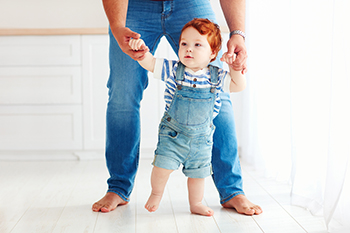
Many new parents often go to great lengths to protect the health of their newborn baby. One critical element of protecting a newborn’s health is helping the baby maintain proper foot care. Sometimes, it is possible for newborns to demonstrate slight discoloration in the feet. Specifically, the newborn may present an orange or yellowish color in the feet. This phenomenon might be explained by the fact that the baby possibly had an increase in beta-carotene levels of the blood. This condition is sometimes referred to as carotenemia, which can be more prominent in toddlers. If your baby has orange feet, it is suggested that you consult a podiatrist to help address this issue.
Making sure that your children maintain good foot health is very important as they grow. If you have any questions, contact Dr. Tupper of Coshocton Foot Health Center. Our doctor can provide the care you need to keep you pain-free and on your feet.
Keeping Children's Feet Healthy
Having healthy feet during childhood can help prevent medical problems later in life, namely in the back and legs. As children grow, their feet require different types of care. Here are some things to consider...
Although babies do not walk yet, it is still very important to take care of their feet.
Avoid putting tight shoes or socks on his or her feet.
Allow the baby to stretch and kick his or her feet to feel comfortable.
As a toddler, kids are now on the move and begin to develop differently. At this age, toddlers are getting a feel for walking, so don’t be alarmed if your toddler is unsteady or ‘walks funny’.
As your child gets older, it is important to teach them how to take care of their feet.
Show them proper hygiene to prevent infections such as fungus.
Be watchful for any pain or injury.
Have all injuries checked by a doctor as soon as possible.
Comfortable, protective shoes should always be worn, especially at play.
If you have any questions please feel free to contact our office located in Coshocton, OH . We offer the newest diagnostic and treatment technologies for all your foot and ankle needs.
Cellulitis on the Feet

When an individual gets a cut on their foot and it gets infected, cellulitis, a bacterial infection, can develop. The main bacteria responsible for this type of infection are streptococcus and staphylococcus. This infection can happen to anyone, regardless of age or race, but is most common in middle-aged to elderly people, and those with compromised immune systems, circulation problems, or other medical conditions. Cellulitis is not contagious as it forms in the deeper layers of the skin. Symptoms usually begin as a small area of tenderness, swelling, and redness that spreads to adjacent skin. Pain can develop, and it can interfere with normal functioning. If you believe you have cellulitis anywhere on your feet, it is strongly suggested that you contact a podiatrist for treatment.
Wound care is an important part in dealing with diabetes. If you have diabetes and a foot wound or would like more information about wound care for diabetics, consult with Dr. Tupper from Coshocton Foot Health Center. Our doctor will assess your condition and provide you with quality foot and ankle treatment.
What Is Wound Care?
Wound care is the practice of taking proper care of a wound. This can range from the smallest to the largest of wounds. While everyone can benefit from proper wound care, it is much more important for diabetics. Diabetics often suffer from poor blood circulation which causes wounds to heal much slower than they would in a non-diabetic.
What Is the Importance of Wound Care?
While it may not seem apparent with small ulcers on the foot, for diabetics, any size ulcer can become infected. Diabetics often also suffer from neuropathy, or nerve loss. This means they might not even feel when they have an ulcer on their foot. If the wound becomes severely infected, amputation may be necessary. Therefore, it is of the upmost importance to properly care for any and all foot wounds.
How to Care for Wounds
The best way to care for foot wounds is to prevent them. For diabetics, this means daily inspections of the feet for any signs of abnormalities or ulcers. It is also recommended to see a podiatrist several times a year for a foot inspection. If you do have an ulcer, run the wound under water to clear dirt from the wound; then apply antibiotic ointment to the wound and cover with a bandage. Bandages should be changed daily and keeping pressure off the wound is smart. It is advised to see a podiatrist, who can keep an eye on it.
If you have any questions, please feel free to contact our office located in Coshocton, OH . We offer the newest diagnostic and treatment technologies for all your foot care needs.
How Stretches Can Benefit the Feet
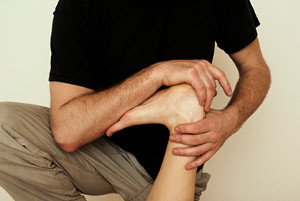
Given the many sources of pain and tightness our feet can endure in life, it behooves us to take regular care of our feet, including stretching them. Moving around in daily life, airplane flights, long car rides, and vigorous exercise can all impact the comfort of our feet. Painful, swollen feet can lead to pain above the feet as well, including the ankles, knees, hips, and back. Stretches can be performed to soothe the feet, improve flexibility, and help with circulation. A few examples of foot stretches include the point and flex exercise, the foot prayer, and the inner ankle stretch. The point and flex exercise is done while sitting on the floor or a workout bench with the feet pointed out in front of you. From this position, point and flex the feet and toes repeatedly. The foot prayer consists of sitting in the same position and then rotating the feet inward, bringing the soles of the feet together. Hold for three seconds before straightening the legs out and repeating. The inner ankle stretch also starts with the feet pointed out in front of you and the feet flexed. The feet should then be rotated outward until a gentle stretch is felt in the inner ankle and foot. As with the prior exercise, stretching should be held for three seconds and repeated. If you regularly suffer from foot pain or tightness and want more information on stretches you can do for your feet, it is suggested that you consult with a podiatrist for further discussion on this issue.
Stretching the feet is a great way to prevent injuries. If you have any concerns with your feet consult with Dr. Tupper from Coshocton Foot Health Center. Our doctor will assess your condition and provide you with quality foot and ankle treatment.
Stretching the Feet
Being the backbone of the body, the feet carry your entire weight and can easily become overexerted, causing cramps and pain. As with any body part, stretching your feet can serve many benefits. From increasing flexibility to even providing some pain relief, be sure to give your feet a stretch from time to time. This is especially important for athletes or anyone performing aerobic exercises, but anyone experiencing foot pain or is on their feet constantly should also engage in this practice.
Great ways to stretch your feet:
- Crossing one leg over the others and carefully pull your toes back. Do 10-20 repetitions and repeat the process for each foot
- Face a wall with your arms out and hands flat against the wall. Step back with one foot and keep it flat on the floor while moving the other leg forward. Lean towards the wall until you feel a stretch. Hold for 30 seconds and perform 10 repetitions for each foot
- Be sure not to overextend or push your limbs too hard or you could risk pulling or straining your muscle
Individuals who tend to their feet by regular stretching every day should be able to minimize foot pain and prevent new problems from arising.
If you have any questions, please feel free to contact our office located in Coshocton, OH . We offer the newest diagnostic and treatment technologies for all your foot care needs.
Facts About Achilles Tendonitis
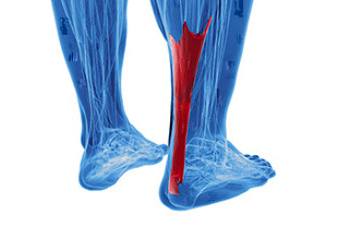
The Achilles tendon, the longest tendon in the body, connects the leg muscles with the heel. It allows you to walk, run, and jump. When the tendon becomes aggravated or inflamed, the condition is known as Achilles tendonitis. There are two types of Achilles tendonitis, insertional and non insertional. Insertional Achilles tendonitis affects the lower portion of the heel and can happen to anyone, whether they are active or not. Noninsertional Achilles tendonitis is more typical among athletes and affects the middle portion of the tendon. The pain, caused by overstressing or overworking the tendon, is generally set off by a sudden change in the intensity of movement. Tight calf muscles and lack of flexibility, which may be brought on by aging, are other common factors. Overuse, often experienced by runners who increase speed, distance, or frequency too quickly, can bring on Achilles tendonitis. Heel pain is the main symptom felt by sufferers of this condition. To find out whether you have Achilles tendonitis, it is suggested that you make an appointment with a podiatrist.
Achilles tendon injuries need immediate attention to avoid future complications. If you have any concerns, contact Dr. Tupper of Coshocton Foot Health Center. Our doctor can provide the care you need to keep you pain-free and on your feet.
What Is the Achilles Tendon?
The Achilles tendon is a tendon that connects the lower leg muscles and calf to the heel of the foot. It is the strongest tendon in the human body and is essential for making movement possible. Because this tendon is such an integral part of the body, any injuries to it can create immense difficulties and should immediately be presented to a doctor.
What Are the Symptoms of an Achilles Tendon Injury?
There are various types of injuries that can affect the Achilles tendon. The two most common injuries are Achilles tendinitis and ruptures of the tendon.
Achilles Tendinitis Symptoms
- Inflammation
- Dull to severe pain
- Increased blood flow to the tendon
- Thickening of the tendon
Rupture Symptoms
- Extreme pain and swelling in the foot
- Total immobility
Treatment and Prevention
Achilles tendon injuries are diagnosed by a thorough physical evaluation, which can include an MRI. Treatment involves rest, physical therapy, and in some cases, surgery. However, various preventative measures can be taken to avoid these injuries, such as:
- Thorough stretching of the tendon before and after exercise
- Strengthening exercises like calf raises, squats, leg curls, leg extensions, leg raises, lunges, and leg presses
If you have any questions please feel free to contact our office located in Coshocton, OH . We offer the newest diagnostic tools and technology to treat your foot and ankle needs.
Plantar Warts Can Be Treated!
Growth of Toenails
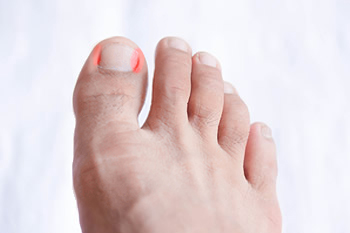
Learning about the biomechanics of the feet can be significantly beneficial for anyone who takes the health of their feet seriously. One aspect of the biomechanics of the feet that everyone ought to know about is the growth of the toenails. The toenails serve important functions, protecting the toes and providing a hard outer armor. There are six parts of the nail, including the root, nail bed, nail plate, eponychium, paronychium and hyponychium. Compared to fingernails, toenails grow at a slower rate. For example, it can take 12 to 18 months for a completely new toenail to grow from the root of the nail to the tip. If an individual has poor circulation, this might further impede toenail growth. If you are someone that is interested in learning more about the toenails, it is recommended that you schedule an appointment with a podiatrist today.
If you have any concerns about your feet, contact Dr. Tupper from Coshocton Foot Health Center. Our doctor can provide the care you need to keep you pain-free and on your feet.
Biomechanics in Podiatry
Podiatric biomechanics is a particular sector of specialty podiatry with licensed practitioners who are trained to diagnose and treat conditions affecting the foot, ankle and lower leg. Biomechanics deals with the forces that act against the body, causing an interference with the biological structures. It focuses on the movement of the ankle, the foot and the forces that interact with them.
A History of Biomechanics
- Biomechanics dates back to the BC era in Egypt where evidence of professional foot care has been recorded.
- In 1974, biomechanics gained a higher profile from the studies of Merton Root, who claimed that by changing or controlling the forces between the ankle and the foot, corrections or conditions could be implemented to gain strength and coordination in the area.
Modern technological improvements are based on past theories and therapeutic processes that provide a better understanding of podiatric concepts for biomechanics. Computers can provide accurate information about the forces and patterns of the feet and lower legs.
Understanding biomechanics of the feet can help improve and eliminate pain, stopping further stress to the foot.
If you have any questions please feel free to contact our office located in Coshocton, OH . We offer the newest diagnostic and treatment technologies for all your foot and ankle needs.
Newborn Foot Issues
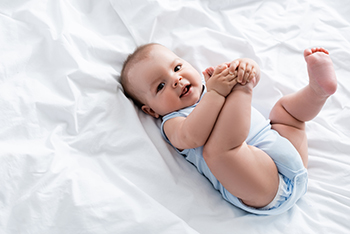
It is common for new parents to be nervous that their newborn is healthy. When foot problems are detected prior to or at birth, parents are naturally concerned. Common congenital foot problems include rotational issues, such as in-toeing or out-toeing and flat feet. In-toeing are when the baby’s feet turn inward; out-toeing is the opposite. Children are born with flat feet and the arch of the foot can either be flexible or rigid. This usually resolves itself as the child grows. Most of the time, parents simply need to be reassured that their child will grow out of the condition they are noticing. However, surgery may be required for children after age 8 if a deformity interferes with normal functioning. If you are expecting a baby or have recently given birth, it is suggested that you consult with a podiatrist to discuss newborn feet, have any concerns put to rest, and treat any feet problems that may need attention.
Congenital foot problems require immediate attention to avoid future complications. If you have any concerns, contact Dr. Tupper of Coshocton Foot Health Center. Our doctor can provide the care you need to keep you pain-free and on your feet.
Congenital foot problems are deformities affecting the feet, toes, and/or ankles that children are born with. Some of these conditions have a genetic cause while others just happen. Some specific foot ailments that children may be born with include clubfeet, polydactyly/macrodactyly, and cleft foot. There are several other foot anomalies that can occur congenitally. What all of these conditions have in common is that a child may experience difficulty walking or performing everyday activities, as well as trouble finding footwear that fits their foot deformity. Some of these conditions are more serious than others. Consulting with a podiatrist as early as possible will help in properly diagnosing a child’s foot condition while getting the necessary treatment underway.
What are Causes of Congenital Foot Problem?
A congenital foot problem is one that happens to a child at birth. These conditions can be caused by a genetic predisposition, developmental or positional abnormalities during gestation, or with no known cause.
What are Symptoms of Congenital Foot Problems?
Symptoms vary by the congenital condition. Symptoms may consist of the following:
- Clubfoot, where tendons are shortened, bones are shaped differently, and the Achilles tendon is tight, causing the foot to point in and down. It is also possible for the soles of the feet to face each other.
- Polydactyly, which usually consists of a nubbin or small lump of tissue without a bone, a toe that is partially formed but has no joints, or an extra toe.
- Vertical talus, where the talus bone forms in the wrong position causing other bones in the foot to line up improperly, the front of the foot to point up, and the bottom of the foot to stiffen, with no arch, and to curve out.
- Tarsal coalition, when there is an abnormal connection of two or more bones in the foot leading to severe, rigid flatfoot.
- Cleft foot, where there are missing toes, a V-shaped cleft, and other anatomical differences.
- Macrodactyly, when the toes are abnormally large due to overgrowth of the underlying bone or soft tissue.
Treatment and Prevention
While there is nothing one can do to prevent congenital foot problems, raising awareness and receiving neonatal screenings are important. Early detection by taking your child to a podiatrist leads to the best outcome possible.
If you have any questions please feel free to contact our office located in Coshocton, OH . We offer the newest diagnostic tools and technology to treat your foot and ankle needs.
Broken Feet and Hockey
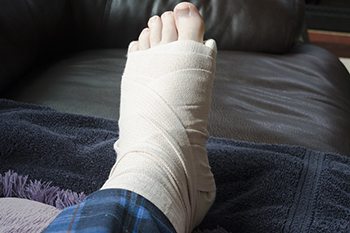
Broken feet are also known as fractured feet, and this condition can develop in an individual for many different reasons. Broken feet can occur as a result of various types of physical activities. For example, some people who play hockey may be at an increased risk of fracturing the bones in their feet. There are many reasons for this. Specifically, hockey pucks can hit players while they are on the ice. If the puck hits the foot and the foot is unprotected, this may cause bones in the feet to break or fracture. Taking a slapshot to the foot is certainly no joke, and the consequences for the feet may be severe. If you are someone that plays ice hockey and you are concerned about the possibility of fracturing your foot, it is suggested that you contact a podiatrist today for more information.
A broken foot requires immediate medical attention and treatment. If you need your feet checked, contact Dr. Tupper from Coshocton Foot Health Center. Our doctor can provide the care you need to keep you pain-free and on your feet.
Broken Foot Causes, Symptoms, and Treatment
A broken foot is caused by one of the bones in the foot typically breaking when bended, crushed, or stretched beyond its natural capabilities. Usually the location of the fracture indicates how the break occurred, whether it was through an object, fall, or any other type of injury.
Common Symptoms of Broken Feet:
- Bruising
- Pain
- Redness
- Swelling
- Blue in color
- Numbness
- Cold
- Misshapen
- Cuts
- Deformities
Those that suspect they have a broken foot shoot seek urgent medical attention where a medical professional could diagnose the severity.
Treatment for broken bones varies depending on the cause, severity and location. Some will require the use of splints, casts or crutches while others could even involve surgery to repair the broken bones. Personal care includes the use of ice and keeping the foot stabilized and elevated.
If you have any questions please feel free to contact our office located in Coshocton, OH . We offer the newest diagnostic and treatment technologies for all your foot and ankle needs.
Falling and Older People
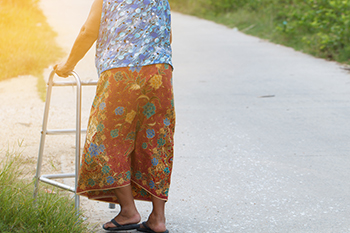
Falling can be life-threatening among the older population. A fracture may happen, and this can impact the ability to complete daily activities. It can change the quality of everyday life, possibly limiting exercising, which may affect cardiovascular health. Effective fall prevention methods can be implemented, which may help limit or prevent falling. These can include installing grab bars in the toilet and shower area, and many patients find it helpful to use a bathmat. Additionally, improving lighting in the household and removing worn rugs from the living room is beneficial. Regular physical and eye examinations can help update existing eyeglasses and medications, and adding handrails to the stairs may help prevent falling episodes. Suppose you would like additional information about how falling can affect the feet and what you can do to protect them. In that case, it is suggested that you confer with a podiatrist who can guide you toward efficient fall prevention techniques.
Preventing falls among the elderly is very important. If you are older and have fallen or fear that you are prone to falling, consult with Dr. Tupper from Coshocton Foot Health Center. Our doctor will assess your condition and provide you with quality advice and care.
Every 11 seconds, an elderly American is being treated in an emergency room for a fall related injury. Falls are the leading cause of head and hip injuries for those 65 and older. Due to decreases in strength, balance, senses, and lack of awareness, elderly persons are very susceptible to falling. Thankfully, there are a number of things older persons can do to prevent falls.
How to Prevent Falls
Some effective methods that older persons can do to prevent falls include:
- Enrolling in strength and balance exercise program to increase balance and strength
- Periodically having your sight and hearing checked
- Discuss any medications you have with a doctor to see if it increases the risk of falling
- Clearing the house of falling hazards and installing devices like grab bars and railings
- Utilizing a walker or cane
- Wearing shoes that provide good support and cushioning
- Talking to family members about falling and increasing awareness
Falling can be a traumatic and embarrassing experience for elderly persons; this can make them less willing to leave the house, and less willing to talk to someone about their fears of falling. Doing such things, however, will increase the likelihood of tripping or losing one’s balance. Knowing the causes of falling and how to prevent them is the best way to mitigate the risk of serious injury.
If you have any questions, please feel free to contact our office located in Coshocton, OH . We offer the newest diagnostic and treatment technologies for all your foot care needs.
More...
Arthritis Can Cause Pain in the Feet and Ankles
Examples of Achilles Tendon Injuries
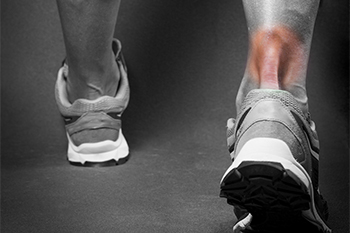
The Achilles tendon connects the calf muscles to the heel. It is located in the lower part of the calf, and it is responsible for walking, running, and standing on tiptoes. If this tendon becomes injured, it can cause severe pain and discomfort. An injury can happen from increasing speed and distance too quickly, a common injury among runners. The tendon can become partially or completely torn, and there are similar symptoms that can accompany either type. These symptoms can include hearing a popping sound at the time of the injury, and the heel may be swollen, painful, or stiff. There are two types of Achilles tendonitis, and they are classified as non insertional and insertional. The former may be more prevalent among younger people, and it affects the fibers in the middle of the tendon. The latter involves the fibers in the lower part of the tendon, and both can result from overuse. Partial tears may gradually heal on their own, with adequate rest and keeping as much weight off of the foot as possible. If the tendon is completely torn, it is suggested that a podiatrist who can effectively treat an Achilles tendon injury be contacted as quickly as possible .
Achilles tendon injuries need immediate attention to avoid future complications. If you have any concerns, contact Dr. Tupper of Coshocton Foot Health Center. Our doctor can provide the care you need to keep you pain-free and on your feet.
What Is the Achilles Tendon?
The Achilles tendon is a tendon that connects the lower leg muscles and calf to the heel of the foot. It is the strongest tendon in the human body and is essential for making movement possible. Because this tendon is such an integral part of the body, any injuries to it can create immense difficulties and should immediately be presented to a doctor.
What Are the Symptoms of an Achilles Tendon Injury?
There are various types of injuries that can affect the Achilles tendon. The two most common injuries are Achilles tendinitis and ruptures of the tendon.
Achilles Tendinitis Symptoms
- Inflammation
- Dull to severe pain
- Increased blood flow to the tendon
- Thickening of the tendon
Rupture Symptoms
- Extreme pain and swelling in the foot
- Total immobility
Treatment and Prevention
Achilles tendon injuries are diagnosed by a thorough physical evaluation, which can include an MRI. Treatment involves rest, physical therapy, and in some cases, surgery. However, various preventative measures can be taken to avoid these injuries, such as:
- Thorough stretching of the tendon before and after exercise
- Strengthening exercises like calf raises, squats, leg curls, leg extensions, leg raises, lunges, and leg presses
If you have any questions please feel free to contact our office located in Coshocton, OH . We offer the newest diagnostic tools and technology to treat your foot and ankle needs.
Ankle Pain and Avulsion Fractures
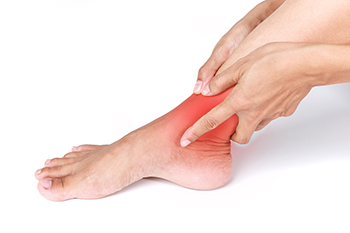
The ankle is an essential part of the human foot because it can act as a shock absorber and help facilitate motion. However, the ankle can also be subject to a significant amount of pain, which can cause discomfort to patients. One reason why the ankle might be subject to pain is due to something called an avulsion fracture. An avulsion fracture is a condition that can occur when, at the ligamentous or tendinous attachment, a piece of a bone is drawn away. Avulsion fractures at the ankle can be caused by a traumatic traction, when the tendon can bear more load than the bone. If you are someone that has recently endured an avulsion fracture, it is suggested that you schedule an appointment with a podiatrist immediately.
Ankle pain can be caused by a number of problems and may be potentially serious. If you have ankle pain, consult with Dr. Tupper from Coshocton Foot Health Center. Our doctor will assess your condition and provide you with quality foot and ankle treatment.
Ankle pain is any condition that causes pain in the ankle. Due to the fact that the ankle consists of tendons, muscles, bones, and ligaments, ankle pain can come from a number of different conditions.
Causes
The most common causes of ankle pain include:
- Types of arthritis (rheumatoid, osteoarthritis, and gout)
- Ankle sprains
- Broken ankles
- Achilles tendinitis
- Achilles tendon rupture
- Stress fractures
- Bursitis
- Tarsal tunnel syndrome
- Plantar fasciitis
Symptoms
Symptoms of ankle injury vary based upon the condition. Pain may include general pain and discomfort, swelling, aching, redness, bruising, burning or stabbing sensations, and/or loss of sensation.
Diagnosis
Due to the wide variety of potential causes of ankle pain, podiatrists will utilize a number of different methods to properly diagnose ankle pain. This can include asking for personal and family medical histories and of any recent injuries. Further diagnosis may include sensation tests, a physical examination, and potentially x-rays or other imaging tests.
Treatment
Just as the range of causes varies widely, so do treatments. Some more common treatments are rest, ice packs, keeping pressure off the foot, orthotics and braces, medication for inflammation and pain, and surgery.
If you have any questions, please feel free to contact our office located in Coshocton, OH . We offer the newest diagnostic and treatment technologies for all your foot care needs.
Heel Pain and Cancer
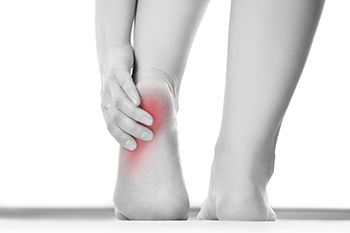
Heel pain can be an annoyance for a variety of patients for many different reasons. For example, heel pain may be linked to a condition known as plantar fasciitis. Alternatively, heel pain could be caused by an individual’s obesity and the extent to which their excess weight is putting added pressure on the feet. However, heel pain might also be a side effect of certain cancer treatments. Sometimes, when an individual with cancer receives treatment, heel pain can result. The reason for this is that some treatments lead to a loss of bone density and even muscle wasting. As a result, conditions such as plantar fasciitis can become more likely and ultimately cause heel pain. If you are someone that is receiving cancer treatment and you have heel pain, it is suggested that you contact a podiatrist today.
Many people suffer from bouts of heel pain. For more information, contact Dr. Tupper of Coshocton Foot Health Center. Our doctor can provide the care you need to keep you pain-free and on your feet.
Causes of Heel Pain
Heel pain is often associated with plantar fasciitis. The plantar fascia is a band of tissues that extends along the bottom of the foot. A rip or tear in this ligament can cause inflammation of the tissue.
Achilles tendonitis is another cause of heel pain. Inflammation of the Achilles tendon will cause pain from fractures and muscle tearing. Lack of flexibility is also another symptom.
Heel spurs are another cause of pain. When the tissues of the plantar fascia undergo a great deal of stress, it can lead to ligament separation from the heel bone, causing heel spurs.
Why Might Heel Pain Occur?
- Wearing ill-fitting shoes
- Wearing non-supportive shoes
- Weight change
- Excessive running
Treatments
Heel pain should be treated as soon as possible for immediate results. Keeping your feet in a stress-free environment will help. If you suffer from Achilles tendonitis or plantar fasciitis, applying ice will reduce the swelling. Stretching before an exercise like running will help the muscles. Using all these tips will help make heel pain a condition of the past.
If you have any questions please contact our office located in Coshocton, OH . We offer the newest diagnostic and treatment technologies for all your foot and ankle needs.


